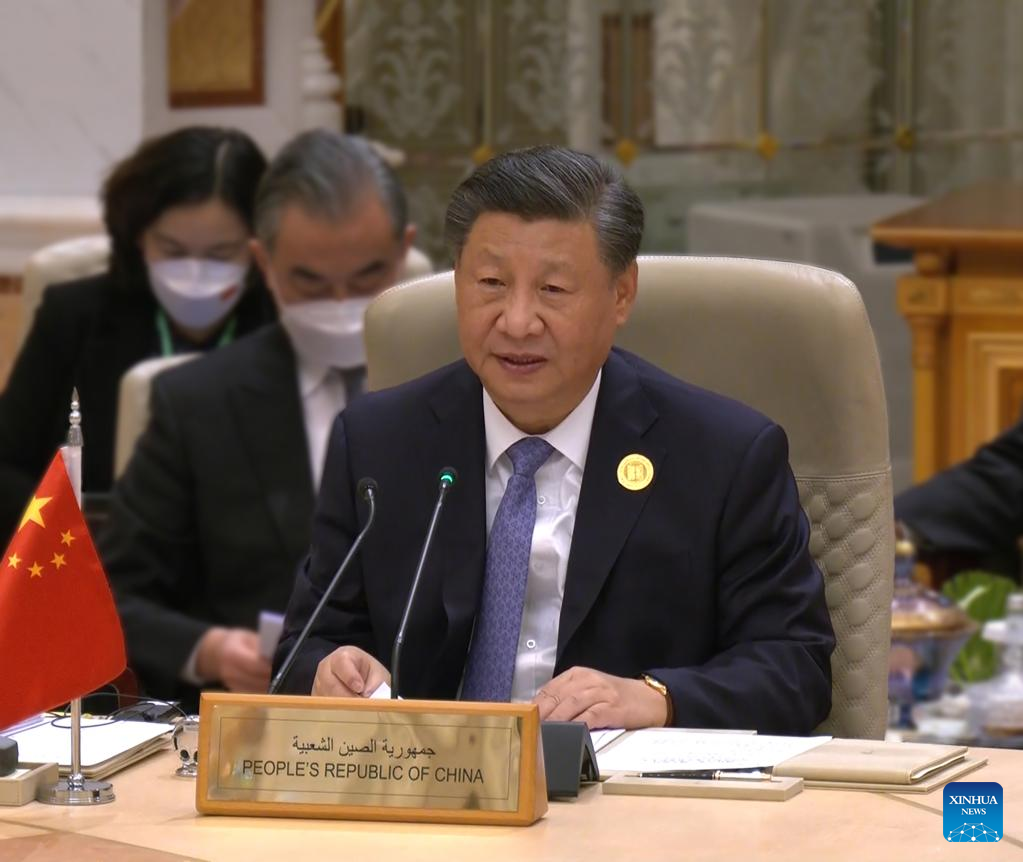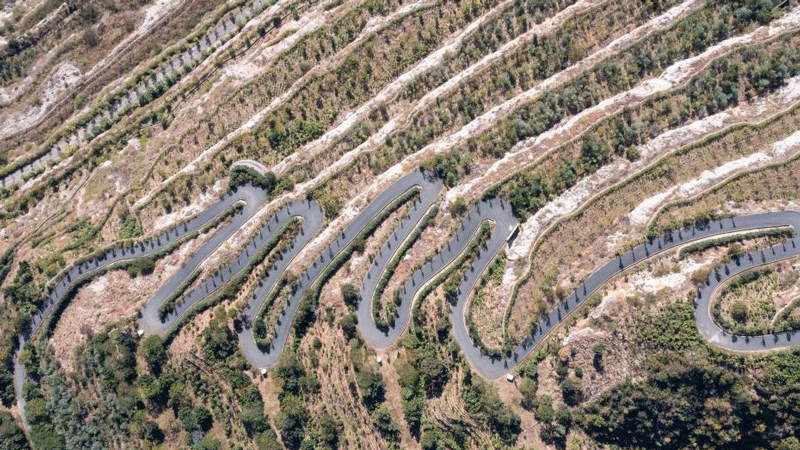Xi's visit leads to new era for Mideast ties

President Xi Jinping attends the China-Gulf Cooperation Council (GCC) Summit and delivers a keynote speech titled "Building on Past Achievements and Jointly Creating a Brighter Future of China-GCC Relations", in Riyadh, Saudi Arabia, Dec 9, 2022. [Photo/Xinhua]
Beijing's partnership with Riyadh, GCC, Arab states has been enhanced
President Xi Jinping's landmark visit to the Middle East has cemented China's strategic partnership with Arab states, mapping out joint actions for pragmatic cooperation and ushering in a new era for the building of a community with a shared future, said officials and experts.
The president returned to China on Saturday after wrapping up his four-day trip to Riyadh, during which he made his first state visit to Saudi Arabia in six years and attended the first China-Arab States Summit and the China-Gulf Cooperation Council Summit.
The trip, marking a diplomatic action of the highest level and largest scale by China with the Arab world, has led Beijing's ties with Riyadh, the GCC and Arab states into a new era of comprehensive and in-depth development, said State Councilor and Foreign Minister Wang Yi after the conclusion of the trip.
Wang, who is also a member of the Political Bureau of the Communist Party of China Central Committee, said the proposals made by Xi at the summit with Arab leaders outlined the pathways forward for the building of a China-Arab community with a shared future and the top-level design for growth of relations in the new era.
Xi laid out eight major initiatives on the pragmatic cooperation in various sectors at the summit with Arab leaders. Among these, Beijing will discuss with the Arab side the implementation of assistance projects worth 5 billion yuan ($718.7 million) and strive to boost annual trade to $430 billion by 2027, from $330.3 billion in 2021.
Beijing also extended a positive message on hosting the next China-Arab States Summit, the date for which will be decided by both sides.
Wu Bingbing, director of the Center for Middle East Studies at Peking University, said Xi's latest trip to the Middle East was significant in that it elevated China's ties with Arab nations to head-of-state diplomacy under a multilateral framework, and institutionalized the elevation in relations.
"The most prominent significance of the summit lies in the political and diplomatic level," she said.
Beijing is also advocating the establishment of an inclusive mechanism for the security of the Middle East, especially through the building of a new security architecture in the region and appeals for common security, Wu said.
"China's cooperation with the GCC and the League of Arab States is not exclusive," she said, adding that the nation welcomes cooperation with other players such as Europe and Russia.
The summit between Xi and leaders from the GCC, the first of its kind, also yielded a host of tangible outcomes.
Xi pledged more energy deals, including for crude oil and liquefied natural gas, with the big Gulf oil producers, and urged the two sides during his keynote speech at the China-GCC Summit to enhance cooperation in finance, investment, innovation, aerospace and culture.
"President Xi's speech was sincere and compelling, which cemented the political mutual trust and furthered the integration of interests between China and the GCC," said State Councilor Wang.
During the summit between Xi, leaders of the six Gulf states and GCC Secretary-General Nayef Falah Al-Hajraf, an action plan was adopted for strategic dialogue between China and the GCC from 2023-27.
Mehran Kamrava, a professor of government at Georgetown University in Qatar, said the action plan is an indication of the growing importance of the Persian Gulf region on the one hand and of China's more active global diplomacy on the other.
Gokhan Ereli, Gulf studies coordinator at the Center for Middle Eastern Studies in Turkiye, said that the summit between China and the GCC countries stood out as one of the most comprehensive summits held in recent times.
China's crude oil imports from the GCC grew 7.8 percent last year to 202 million metric tons, representing close to 40 percent of the nation's crude oil imports in 2021.
Xi's state visit to Saudi Arabia ushered in a new era of bilateral relations. The two sides signed 20 cooperation agreements covering energy, investment, justice, education and media. Beijing agreed to include Saudi Arabia as one of the destinations for Chinese tourists on organized tours to expand bilateral people-to-people exchanges.
William Jones, a nonresident fellow at Renmin University of China's Chongyang Institute for Financial Studies, wrote in a research note that Xi's visit to Riyadh marked a step forward in Sino-Saudi relations.
"While much of the country-to-country interaction has been in the field of trade and investment, it has now broadened into a comprehensive strategic partnership," he said.
The visit to Saudi Arabia will take overall Sino-Arab relations to a new level, from economy and trade to increasing cooperation in the areas of culture, politics and security, he added.
Photos
Related Stories
- Xi's trip to Middle East significant to promoting peace, cooperation
- China, Saudi Arabia achieve steady progress in cultural communication
- China, Saudi Arabia see constant outcomes of cooperation
- China, Arab states drawing blueprint for future development
- To build a China-Arab community with a shared future in the new era
- China ready to work with Mauritania to elevate friendly cooperation to higher levels, Xi says
Copyright © 2022 People's Daily Online. All Rights Reserved.









